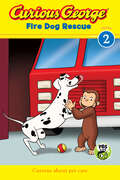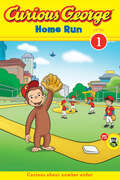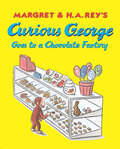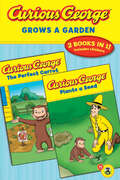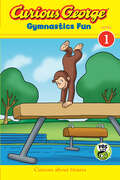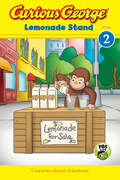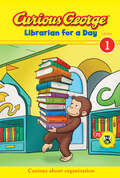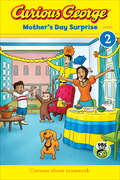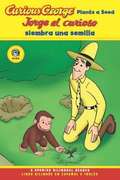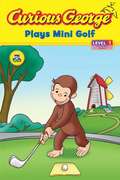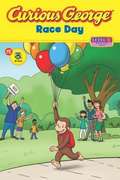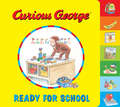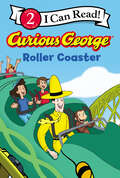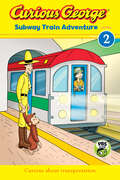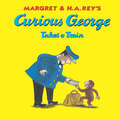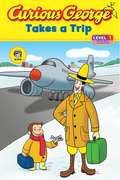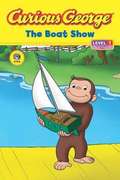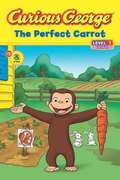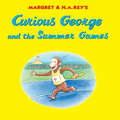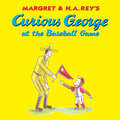- Table View
- List View
Curious George Discovers Space (Curious George)
by H.A. ReyCurious George embarks on an out-of-this world adventure and lends some helping hands—and feet—to save the space station astronauts. George is thrilled to visit the Space Center to help Professor Pizza and Professor Einstein. First up, he&’s making a special delivery to the international space station. Then it&’s time to help solve a problem with the Mars rover, and George dreams of going where no monkey (or human) has gone before—Mars! Join George on an exciting journey into outer space and learn all about space travel, gravity, the solar system, and Mars. Based on the Emmy-winning PBS show, this story is filled to the brim with additional facts, real photos, experiments, activities, and more. Learning about science has never been so much fun!
Curious George Discovers the Rainbow (Curious George)
by H.A. ReyColor Curious George amazed when he learns how science and weather turn rain into rainbows! In this exciting new Curious George series all about discovery, George&’s city friends Betsy and Steve are taking their first trip to visit him in the country. When a light rain casts a stunning rainbow in the sky, George is introduced to all the beautiful colors of the spectrum! Come along as he chases the rainbow for his pot of gold and learns all about how rainbows occur and even how to create his own. Based on the Emmy-winning PBS show, this story is filled to the brim with additional facts, real photos, experiments, activities, and more. Learning about science has never been so much fun!
Curious George Discovers the Senses (Curious George)
by H.A. ReyCurious George learns how to hear, smell, taste, touch, and not see so well in the dark in this nighttime adventure! A hole in the roof means George and the man with the yellow hat have to sleep in the living room while their bedrooms are being repaired. But their adventure quickly turns into a disaster when George&’s nightly trips to the kitchen keep his friend awake. Can George use his other senses to quietly find his way to the refrigerator in the dark? Learn all about sight, sound, smell, taste, and touch with your favorite monkey! Based on the Emmy-winning PBS show, this story is filled to the brim with additional facts, real photos, experiments, activities, and more. Learning about science has never been so much fun!
Curious George Discovers the Stars (Curious George)
by H.A. ReyCurious George is too young to stay up all night, but before he gets his ZZZs he&’s going to learn as much as he can about astronomy! George loves summer nights in the country—that&’s where he does his best stargazing. When his friend Bill says that nobody knows how many stars there are, George is determined to count! But how will he keep track? Come along as George learns all about stars, constellations, and the night sky. Based on the Emmy-winning PBS show, this story is filled to the brim with additional facts, real photos, experiments, activities, and more. Learning about science has never been so much fun!
Curious George Fire Dog Rescue: Fire Dog Rescue (CGTV Reader)
by H.A. ReyGeorge and his firefighter friend have a Dalmatian to save! Curious George loves making new friends, and he really hits it off with Blaze, the new fire dog. But Blaze keeps running away from the firehouse, and the firefighters need George&’s help to get her to stay. When Blaze winds up in the animal shelter, George and his firefighter friend Sam learn how to keep her safe by putting a tag on her collar and making sure she&’s not lonely. Based on the Emmy Award–winning PBS TV show, this reader includes bonus activities and further information about pet care and animal shelters. For more monkey fun, check out www.curiousgeorge.com for the latest books, games, activities, and more!
Curious George George Home Run (Curious George)
by H.A. ReyCurious George learns about sports, scoring, and numbers in this triple play of an adventure! George is excited to go to his first baseball game to watch his friend Marco play. While Marco concentrates on hitting his first home run, George gets to play scorekeeper. But George doesn&’t know in which order he should hang the numbers. With help from Marco and the girl at the snack stand, George learns about number sequence and a handy trick for putting double digits in order. During the last inning, George agrees to be a pinch runner for an injured Marco. Will he be able to add another number to the scoreboard? Includes rules of the game and a score-keeping activity.
Curious George Goes to a Chocolate Factory (Curious George)
by Margret Rey H.A. ReyGeorge is monkeying around—and having a delicious adventure! When George and the man with the yellow hat stop to shop at a chocolate factory store, George becomes curious about how the chocolates are made. Though he begins to follow the factory tour, soon he is off to investigate on his own… &“The only predictable thing about that dynamic monkey, Curious George, is his unpredictability.&”—The New York Times
Curious George Grows a Garden: The Perfect Carrot and Plants a Seed (CGTV)
by H.A. ReyGeorge works on his green thumb in this special set of two stories based on the popular animated series! This double early reader features two favorite stories from the Emmy Award-winning PBS show, Curious George Plants a Seed and Curious George The Perfect Carrot! In Curious George Plants a Seed, everyone&’s favorite monkey has to make a few planting mistakes before his green thumb starts to kick in. In Curious George The Perfect Carrot, George learns how to grow a beautiful prize carrot, and then unselfishly uses it to help his neighbor Bill find his lost bunnies. Includes fun facts about supporting locally grown food, a bean sprout planting activity, and a delicious recipe for carrot muffins!
Curious George Gymnastics Fun: Cgtv Reader Bilingual Edition (CGTV Reader)
by H.A. ReyGeorge and friends are on the move in this storybook inspired by the PBS TV show! In this Green Light Reader based on Curious George, the Emmy Award–winning PBS TV show, George is swinging around like only a monkey can. George is taking his first gymnastics class, and boy is he excited! He learns all about the sport and how to practice safely. By the end of class, George, Allie, and Bill want to go to gymnastics every day—but they only have access to the gym once a week. Where will they find a gym they can use all the time? Why not in their own backyard? Includes a recipe for no-bake energy balls and instructions for a game that will put gymnastics skills to the test! For more monkey fun, check out www.curiousgeorge.com and discover all the latest books, games, activities, and more!
Curious George Lemonade Stand (CGTV Reader)
by H.A. ReyIt&’s time for some monkey business! George serves his thirsty customers in this fun story based on the beloved animated show. There&’s nothing like a cold glass of lemonade on a hot summer day! With that in mind, George decides to set up his own lemonade stand to earn money for a new soccer ball. But George has a lot to learn about running a stand. With help from his friend Betsy, George's stand becomes such a success that there are too many customers and not enough lemonade. Will he figure out how to satisfy all his customers and earn enough money for a new soccer ball? This Green Light Reader based on Curious George, the Emmy Award-winning PBS TV show, also includes bonus activities to help reinforce the concepts presented in the story.
Curious George Librarian for a Day (CGTV Reader)
by H.A. ReyGeorge goes bananas for books in this story based on the Emmy-winning animated series… When the librarian Mrs. Dewey leaves George in charge, he&’s in quite the quandary. How will he organize the books? By color? By size? Will he able to shelve them all before Mrs. Dewey comes back? Activities exploring alphabetizing and classification add even more fun to this madcap adventure starring everyone&’s favorite monkey! Investigate www.curiousgeorge.com and discover all the latest on Curious George, books, games, activities, and more!
Curious George Mother's Day Surprise (CGTV Reader)
by H. A. Rey H. A. ReyA level 2 early reader based on Curious George, the Emmy Award-winning PBS TV show, all about surprises, helping friends, and--of course--celebrating mothers! It&’s Mother&’s Day and George's friends Marco and Cecilia want to surprise their mami with a party! George is excited to help Marco make a piñata and other festive decorations while Cecilia and the Man with the Yellow Hat prepare delicious treats. But when Marco and Cecilia see their mami arriving early, they have to scramble to get ready. Will the crew be able to pull the party together in time to make this one Mother&’s Day she&’ll never forget? It's all about teamwork in this level 2 early reader based on the Emmy Award–winning PBS TV show. This book includes a bonus activity with instructions for making your own paper flowers to give to mom!
Curious George Pinata Party (CGTV Reader)
by H. A. ReyAt a birthday party, Curious George discovers how hard it is to hit a pinata without being able to see. He sets out on a trek around the city with the help of Charkie, the dog, to explore using his other senses. When he returns to the party, George applies his heightened senses to make a direct hit at the pinata!Activities include fun suggestions for exploring your senses and a five senses quiz.
Curious George Plants a Seed Spanish/English Bilingual Edition (CGTV Reader)
by H. A. ReyCurious George watches Jumpy the squirrel bury an acorn in the yard. Upon learning that Jumpy is storing food for later, George decides to do the same. The man with the yellow hat comes home to find the kitchen empty and its contents buried in the yard! It's time to teach George about what things grow and what don't. George finally gets it right when he grows a beautiful sunflower from a seed.
Curious George Plays Mini Golf
by H. A. ReyCurious George is invited to play mini golf with his friend Steve. When George gets the highest score he thinks he has won until Steve explains the rules—the person with the lowest score is the winner. George decides to practice, and he creates his own golf course at home, then challenges Steve to play his version of mini golf.
Curious George Race Day (CGTV Reader)
by H. A. ReyCurious George is helping Professor Wiseman train for a race, but she thinks running is boring. Can George find a way to show her that running is fun before the big race?
Curious George Ready for School: Ready for School (Curious George)
by H.A. ReyWhat is it like to go to school? George is about to find out… George is so excited to go visit his friend Rami&’s school! George packs a banana snack and is ready to have an adventure. And what an adventure school is! Between Circle Time, outdoor play, and the many toys and crafts, George is one happy monkey. But can a curious monkey make it through the whole day without getting into any trouble? Young kindergarteners and preschoolers-to-be will get a sense of what a day at school is like, helping them, too, feel ready for school.
Curious George Roller Coaster (I Can Read Level 2)
by H. A. ReyEveryone's favorite curious monkey George learns about height and measurement at an amusement park in this Level Two I Can Read based on the Curious George TV show.Curious George can’t wait to ride the Turbo Python 3000 with his friends Betsy and Steve at the amusement park. But he is not tall enough! Will George figure out how to ride the roller coaster before the end of the day? Curious George Roller Coaster is a Level Two I Can Read book, geared for kids who read on their own but still need a little help. Whether shared at home or in a classroom, the engaging stories, longer sentences, and language play of Level Two books are proven to help kids take their next steps toward reading success.
Curious George Subway Train Adventure: Subway Train Adventure (CGTV Reader)
by H.A. ReyCan George find his way to the zoo all by himself? A storybook based on the beloved PBS series starring everyone&’s favorite monkey. In this Level 2 Green Light Reader based on the Emmy Award-winning PBS show, George can&’t believe his luck when he gets to visit the zoo and ride there on the subway! George is so excited to take the underground train for the first time that he jumps right on, leaving the man with the yellow hat behind in the terminal! Can George maneuver the speedy subway in order to find his friend—and get to the zoo? This subway adventure teaches the basics of reading a map, understanding different directions of travel, and problem-solving, and also includes bonus activities to help reinforce those concepts.
Curious George Takes a Train (Curious George)
by Margret Rey H.A. ReyAt the train station, it&’s up to lovable monkey George to save the day! Curious George heads to the train station to take a trip with the man with the yellow hat. But when he tries to help out the station master, he gets himself into trouble. George finds himself a hiding place—only to discover that his help is really needed when a little boy&’s toy train is about to fall onto the tracks… &“The only predictable thing about that dynamic monkey, Curious George, is his unpredictability.&”—The New York Times
Curious George Takes a Trip
by H. A. ReyCurious George and his friend are going on vacation on an airplane. At check-in, the ticket clerk gives George a toy airplane to play with, but he soon loses it and has a few adventures trying to find it again. What an exciting start to his vacation! Learning concepts: modes of transportation Level one in Houghton's new Curious George reader line means that the text is minimal and simple, perfect for readers learning to sound out words while looking at the art for visual clues.
Curious George The Boat Show (CGTV Reader)
by H. A. ReyWhen his friend Bill asks George to mind his model boat, George accidentally sinks the boat right before a model boat competition.Experimenting with the buoyancy of his toys, though, George is able to construct another boat that floats. Level one in Houghton's new reader line means that text is minimal and simple, perfect for readers learning to sound out words and looking at art for visual clues.Activities include making a paper boat and experimenting with buoyancy.
Curious George The Perfect Carrot (CGTV Reader)
by H. A. ReyWith the help of the man with the yellow hat, Curious George plants and grows carrots in a little garden plot of his own. When his carrots are finally ready to be pulled from the ground, George decides that his prize carrot is too perfect to eat. But when George stumbles upon his friend Bill's pet bunnies lost and hungry, he doesn't hesitate to share his carrot to help save the day. George's food-growing adventure has an environmentally friendly theme and includes fun facts about locally grown foods and a delicious recipe for carrot muffins.
Curious George and the Summer Games (Curious George)
by H. A. ReyGeorge is curious about all the field day Summer Games, but what sporting event will he compete in?Every year, the town has a Summer Games field day, and George wants to join in on the fun, especially if the prize is a medal! But what is the perfect Summer Games event for a little monkey? When George finds a sport that he loves and is a natural at, he must practice, practice, practice. With some teamwork and cheering on the contestants, George is ready to make this the best Summer Games!
Curious George at the Baseball Game (Curious George)
by Margret Rey H.A. ReyPlay ball! A lively storybook starring the &“adorable but trouble-making primate&” (Forbes). George is going to watch a baseball game, accompanied by the man with the yellow hat. But one curious little monkey in one big stadium makes for one exciting day at the ballpark! &“The only predictable thing about that dynamic monkey, Curious George, is his unpredictability.&”—The New York Times




